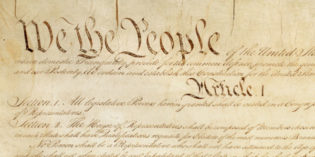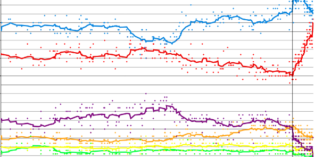Informing and engaging citizens

Do you get a say? How and why geography divides the British over their political influence
The extent of discontent with established politics in the UK has been laid bare in recent years. One popular explanation puts geography centre-stage: positing a divide between Londoners’ relative contentment and the angry North. Using data from fifteen years of surveys, Lawrence McKay explores geographic differences in perceived influence over national politics. This analysis shows the regional divides are real, accounting for key factors such as class, education and age. More work is needed to establish causes, but surveys suggest the drivers include the view that London is subject to favouritism in policy-making and the perception of a ‘London-centric’ political class.

Digital campaigning and the GetUp effect in Australia’s 2016 election
GetUp is a unique political organisation in Australian politics. Since their formation in mid-2005 they have accrued over 1,000,000 members, and fundraise about $8 million annually, from mostly small donations. In 2016 they had their most successful election campaign so far, writes Ariadne Vromen, in terms of both member mobilisation and political impact.

‘New poll suggests…’: How to tell when public opinion has really changed
Every day we are being presented with new opinion polls on various social and political issues, but do these really represent public attitudes? Using a statistical method called bootstrapping to estimate sampling variance, Patrick Sturgis and Jouni Kuha explain how such an approach can improve the quality of debate about UK public opinion.

Why it’s not just about the outcome: citizens also care about democratic decision-making
A well-known claim for citizens’ involvement in politics is that, when things are going well, they care little about participating in decision-making processes. Michael A. Strebel, Daniel Kübler and Frank Marcinkowski test this claim, and find that, in fact, democratic participation and transparency matter for citizens too, independently of the specific policy outcome.

Making a 21st century constitution: the rules we have established for democracies are now outdated
Democratic constitutions are unfit for purpose, with governments facing increased pressures from populists and distrust from citizens. The only way to truly solve these problems is through reform, argues Frank Vibert. He draws on his new book on the topic and sets out the ways in which constitutions should be revitalised.

A changing democracy: the British political tradition has never been more vulnerable
Never before has the British political tradition been more contested, write Matthew Hall, David Marsh and Emma Vines. They explain that British democracy is facing three major challenges – Scottish independence, Brexit, and anti-politics – and these have the potential to force change on an otherwise stale political establishment.

Evidence from Scotland and Wales: representatives elected via party lists are less likely to reply to constituents – but we should be careful about the conclusions we draw
Websites such as WriteToThem.com make it simple for constituents to contact their elected representatives, but how responsive are politicians to these communications? And does the system by which they are elected shape their responses? Research by Alex Parsons and Rebecca Rumbul shows that under the UK’s Additional Member Systems, constituency representatives are more likely to reply than those elected via party list. This raises further research questions about the subjects they reply about and different priorities for representatives under this system.

The Irish Citizens’ Assembly on the 8th Amendment is a model for participatory democracy, which other democratic countries should follow
Ireland’s referendum to repeal the 8th Amendment of its constitution, and so liberalise the country’s abortion laws, was preceded by a Citizens’ Assembly which recommended these reforms. This form of democratic participation, which crucially was state funded and informed the Irish government’s approach, is a model for producing better democratic decision making, argues Jack Bridgewater.

Are citizens good judges of government performance? Evaluations of promise keeping by governing parties
Only a minority of UK citizens think that politicians generally keep their election promises. However, research by Robert Thomson and Heinz Brandenburg indicates that the public are good at evaluating whether politicians have kept specific policy pledges, but this is affected by their pre-existing levels of distrust in politicians and in particular parties.

The limitations of opinion polls – and why this matters for political decision making
Recent research by Jennings and Wlezien has demonstrated that political polling has remained as accurate as ever in terms of margin of error in the week prior to an election. However, polls are usually publicly judged on whether they call the result correctly. In this, writes Sean Swan, they have been less accurate over recent UK elections. This has particular consequences for how and when political leaders make decisions about discretionary elections, and so it matters that we understand polls and their limitations correctly.


 Democratic Audit's core funding is provided by the Joseph Rowntree Charitable Trust. Additional funding is provided by the London School of Economics.
Democratic Audit's core funding is provided by the Joseph Rowntree Charitable Trust. Additional funding is provided by the London School of Economics.